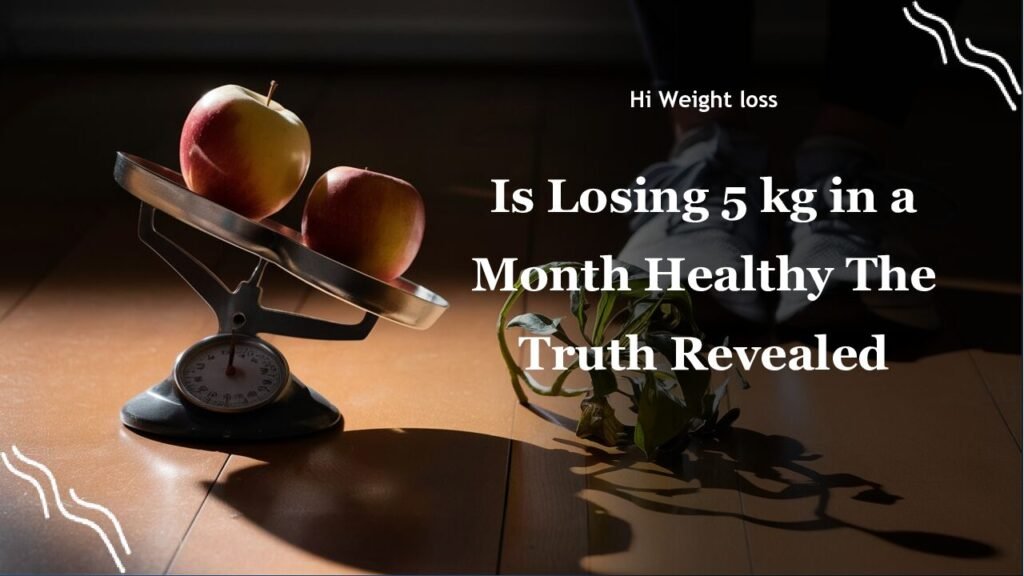Wanting to lose weight is a common goal, but is losing 5 kg in a month healthy? It’s easy to get caught up in the desire for quick results, but rapid weight loss can sometimes lead to more problems than solutions. This article will explore if such a rapid pace is safe, especially for beginners, and what you can do to achieve sustainable weight loss without harming your health. We’ll discuss the risks associated with rapid weight loss and guide you toward healthier, more sustainable strategies that prioritize your overall well-being.
Is Losing 5 kg in a Month Healthy?
The question of whether losing 5 kg (approximately 11 pounds) in a month is healthy often sparks debate. While it might seem like a great achievement to see the numbers on the scale drop so quickly, it’s crucial to understand what rapid weight loss entails. The generally recommended rate of weight loss for safe and sustainable results is about 1 to 2 pounds per week, which translates to around 4 to 8 pounds per month. Losing 5 kg in a month exceeds this recommendation and can raise some red flags. Experts generally advise a more gradual approach. When I first embarked on my weight loss journey, I was tempted by those “lose weight fast” promises. I learned the hard way that sustainable results are far more important than fleeting achievements.
The Risks of Rapid Weight Loss
When you lose weight too quickly, your body doesn’t just shed fat. It also tends to lose muscle mass, which can negatively affect your metabolism. Muscle is crucial for burning calories, even at rest. If you lose too much muscle, you might find yourself struggling to maintain your weight loss over time. I witnessed a friend of mine go through a drastic diet, and while she lost weight, she was always tired and irritable.
Additionally, rapid weight loss can increase your risk of nutritional deficiencies. Drastic diets often cut out entire food groups, making it difficult to obtain all the necessary vitamins and minerals for your body to function optimally. This can lead to fatigue, weakened immunity, and other health problems. I remember trying an extreme cleanse for a week once and I felt so weak I had to stop before completing it. Rapid weight loss can also result in gallstones, electrolyte imbalances, and dehydration. So, while rapid results may be appealing, it’s essential to consider the health risks involved.
Is Losing 5 kg in a Month Safe and Sustainable?
The safety and sustainability of losing 5 kg in a month are questionable. For most people, it’s not a sustainable rate of weight loss and could even be harmful in the long term. Sustainable weight loss is about making lifestyle changes that you can maintain for years to come, not about quick fixes. A balanced diet that includes all major food groups combined with regular physical activity is the most effective and healthiest way to manage your weight. The Centers for Disease Control and Prevention (CDC) emphasizes the importance of gradual, steady weight loss. It’s far more likely that you’ll maintain your results if you take a moderate approach, so be patient and focus on long-term results.

Is Losing 5 kg in a Month Healthy for Beginners?
If you’re new to the world of weight loss, it is generally recommended to avoid a rapid 5kg weight loss plan. As a beginner, your body needs time to adapt to the changes you are making in your diet and exercise. If you try to lose too much weight too quickly, you’re more likely to get discouraged and fall off the wagon. Starting slowly with a focus on developing healthy habits instead of chasing fast results, will set you up for long-term success. Remember, sustainable changes, not drastic ones, bring long-term success.
Think of it like learning a new skill. You wouldn’t try to master a complex instrument overnight, would you? Similarly, weight loss should be approached with patience and consistency, especially for beginners. Focus on small, achievable goals and gradually increase your activity levels. For example, start with walking 30 minutes most days of the week and gradually increase the intensity and duration of your workouts. Remember that any journey is better started with a strong foundation and in small steps.
How to Lose Weight Safely and Sustainably
Now that we’ve discussed the risks of rapid weight loss, let’s talk about how to lose weight safely and sustainably. The key is to focus on a holistic approach that includes a healthy diet, regular physical activity, adequate sleep, and stress management. Here are some tips to get you started:
1. Balanced Diet
Focus on eating a balanced diet rich in fruits, vegetables, whole grains, and lean proteins. Reduce your intake of processed foods, sugary drinks, and unhealthy fats. Make sure you’re getting enough fiber, which helps you feel full and satisfied for longer. When I changed my diet to include more whole foods, I realized I felt much more energetic.
2. Regular Physical Activity
Aim for at least 150 minutes of moderate-intensity aerobic activity per week, or 75 minutes of vigorous-intensity activity. Add some strength training exercises to your routine two or more times per week. Find an activity that you enjoy, making it easier to stay consistent with it over time. I discovered that I love dancing, and that makes exercise so much fun that I look forward to it every day.
3. Adequate Sleep
Make sure you’re getting enough sleep each night, ideally 7 to 9 hours. Lack of sleep can disrupt your hormones, leading to increased cravings and weight gain. I never realized how much sleep impacted my weight until I started prioritizing it, it made a significant difference.
4. Stress Management
Find healthy ways to manage stress, such as yoga, meditation, or spending time in nature. Stress can contribute to overeating and weight gain. I started practicing mindfulness, and it has helped me manage my stress levels, and also make better choices about my diet.
5. Set Realistic Goals
Start with small, achievable goals that will help you stay motivated. Don’t expect to reach your ideal weight overnight, and remember that every small win is still a step forward. I set small goals, celebrate each of them, and that keeps me motivated.
Here’s a simple guide to help you set realistic expectations for your weight loss journey.
| Time Frame | Recommended Weight Loss | Focus |
|---|---|---|
| 1 week | 0.5 to 1 kg (1-2 pounds) | Start with light exercise and healthier food choices. |
| 1 month | 2 to 4 kg (4-8 pounds) | Build consistency with balanced diet and moderate exercise. |
| 3 months | 6 to 12 kg (12-24 pounds) | Increase exercise intensity and find ways to manage stress effectively. |
| 6 months | 12 to 24 kg (24-48 pounds) | Establish sustainable healthy eating and exercise habits. |
Remember, these are just guidelines, and individual results can vary. Consult with a healthcare professional or a registered dietitian to determine the best weight loss strategy for you.
Conclusion
Is losing 5 kg in a month healthy? For most people, the answer is no. While it may be tempting to drop weight quickly, it’s essential to prioritize your health over speed. Focus on a slow and sustainable weight loss approach, and you’ll be much more likely to reach your goals while preserving your overall well-being. Instead of aiming for extreme results, embrace gradual changes that will be consistent and contribute to your overall health. Start small, be consistent, and don’t hesitate to seek guidance from healthcare experts. As I reflect on my journey with weight loss, I’ve come to understand that it’s less about the number on the scale and more about the overall healthy habits we cultivate along the way. Prioritizing your health will not only allow you to lose weight effectively but also live a longer and healthier life. Don’t forget to share this article if you found it useful, so that more people can be aware of the best way to lose weight!
FAQ
Can I lose 5 kg in a month without exercising?
While it is possible to lose weight through diet alone, it’s not generally recommended to rely on just one method. Exercise helps you burn more calories, build muscle, and improve your overall health. Combining a balanced diet with regular physical activity is much more effective for long-term weight loss.
What if I lose more than 2 pounds per week?
If you are losing more than 2 pounds per week, you should consult with a healthcare professional. They can help you assess whether you are losing weight in a healthy way, or if your body needs some extra assistance. Rapid weight loss can result in muscle loss, nutritional deficiencies, and other health problems. So, it’s essential to seek professional advice if you are losing more weight than is recommended.
How important is sleep for weight loss?
Sleep is very important for weight loss. When you do not get enough sleep, your hormones can become unbalanced. This imbalance may result in increased cravings and overeating. Getting enough sleep every night helps your body function properly and makes weight loss more manageable.
Can stress cause weight gain?
Yes, stress can contribute to weight gain. When you’re stressed, your body produces more cortisol, which can increase your appetite and lead to overeating. Managing your stress through healthy coping mechanisms can play an important role in weight management.
How can I stay motivated on my weight loss journey?
Staying motivated can be challenging, but there are strategies that can help. Setting achievable goals, celebrating small victories, finding a workout buddy, and joining a weight loss support group, can all make your journey easier and more enjoyable. Remember to be patient with yourself, and don’t compare yourself to others. It’s all about your personal progress and overall health goals.



